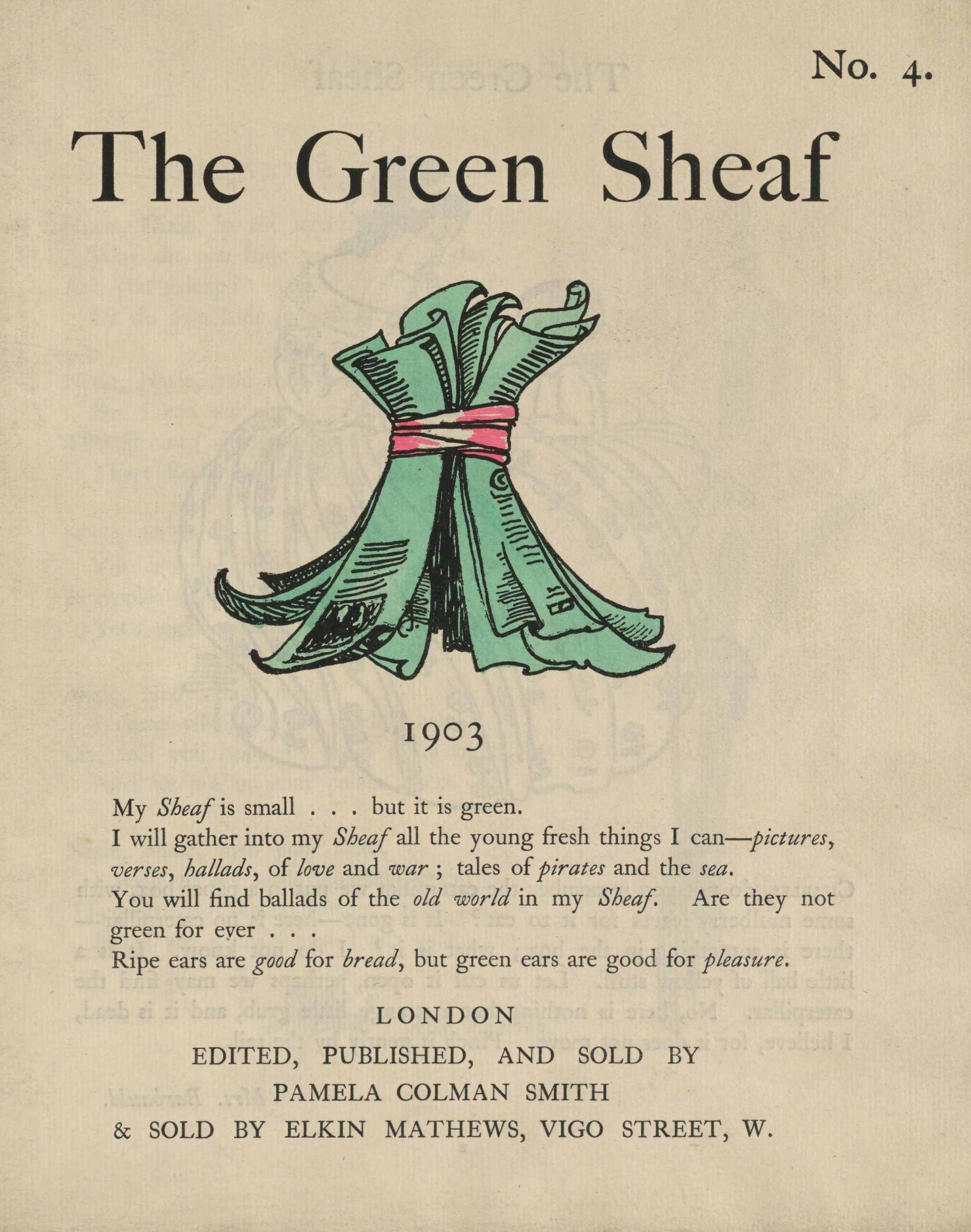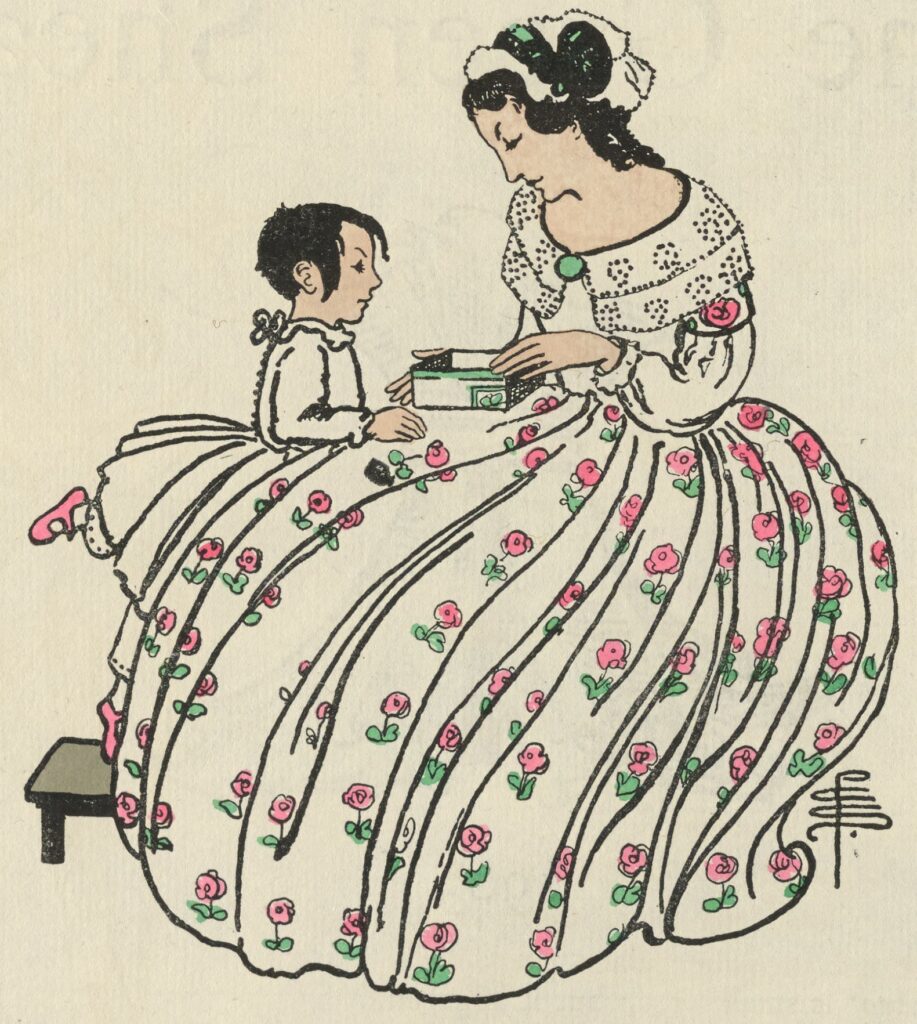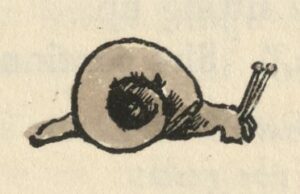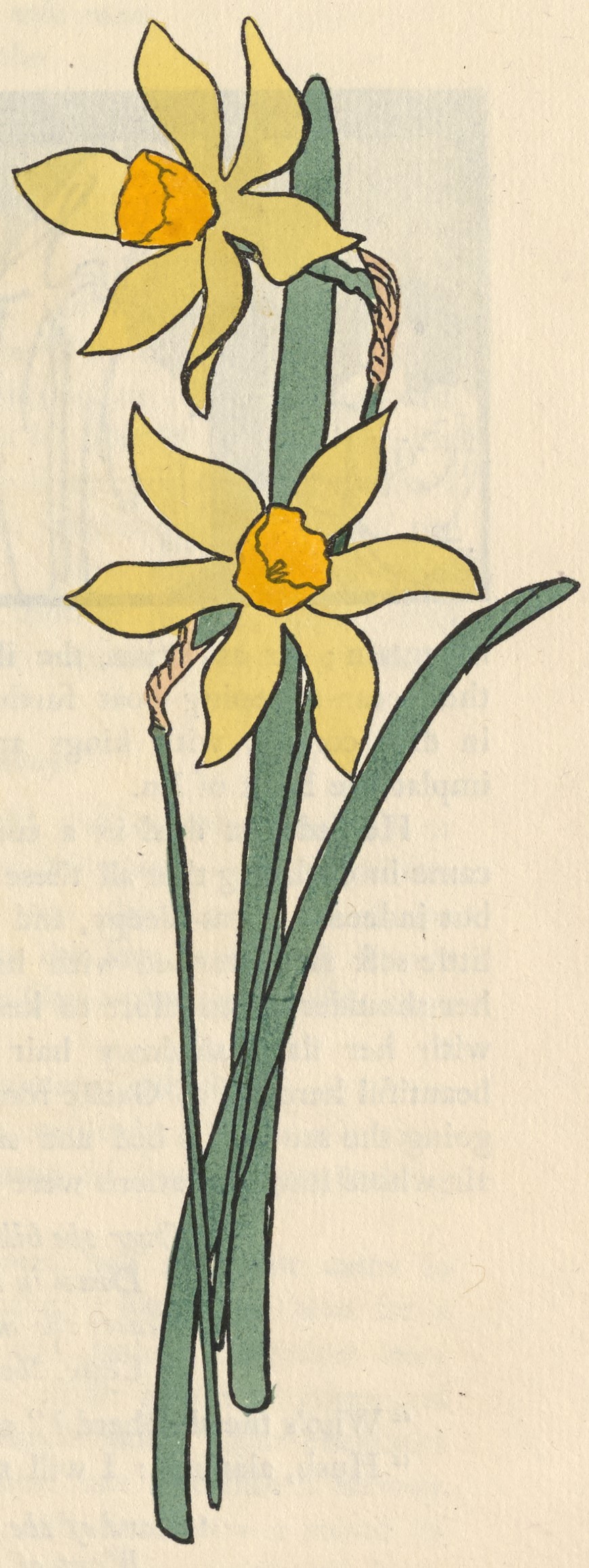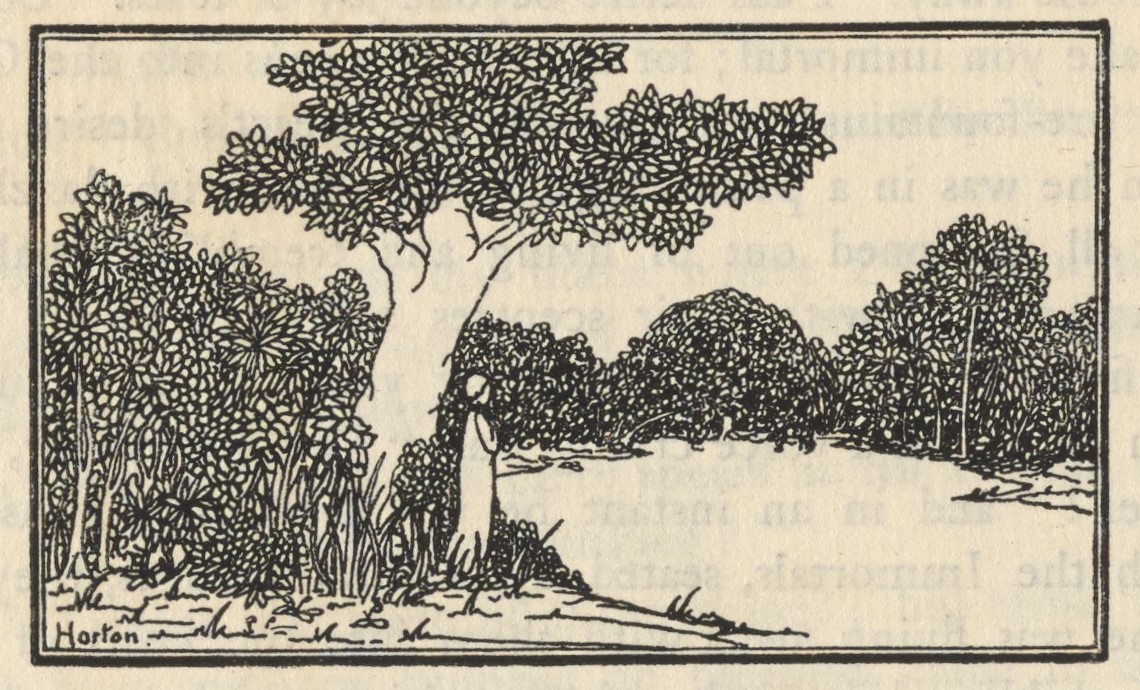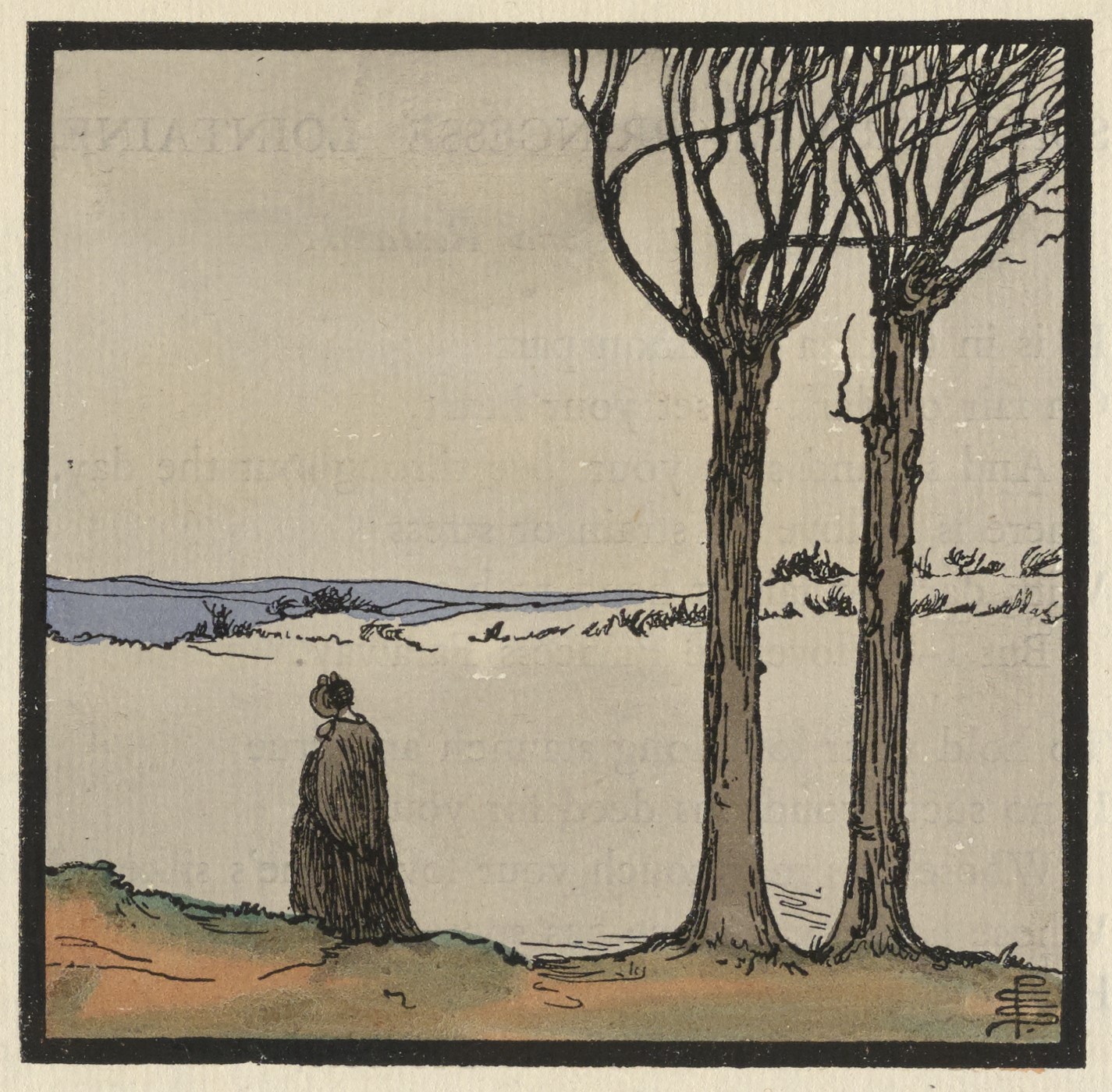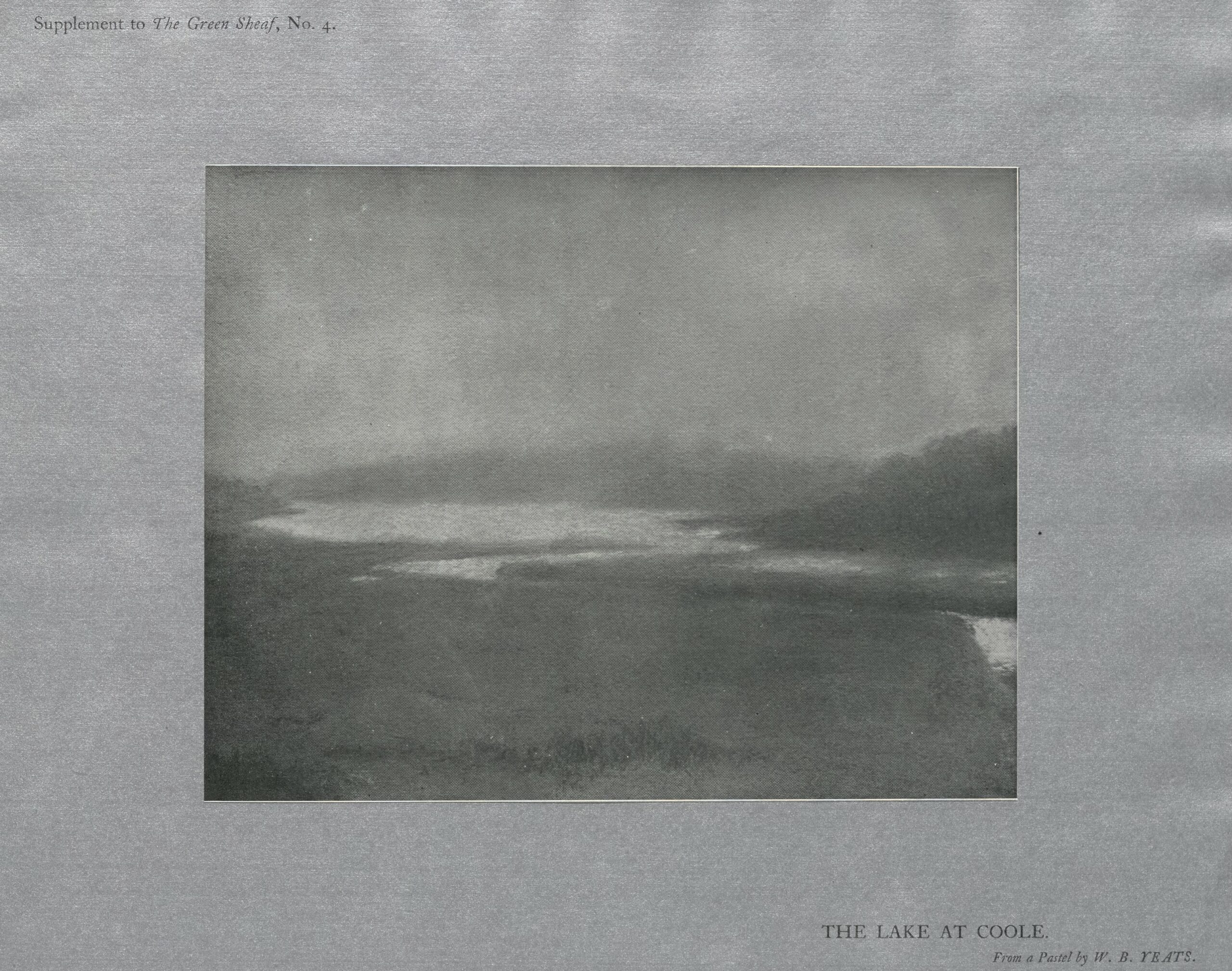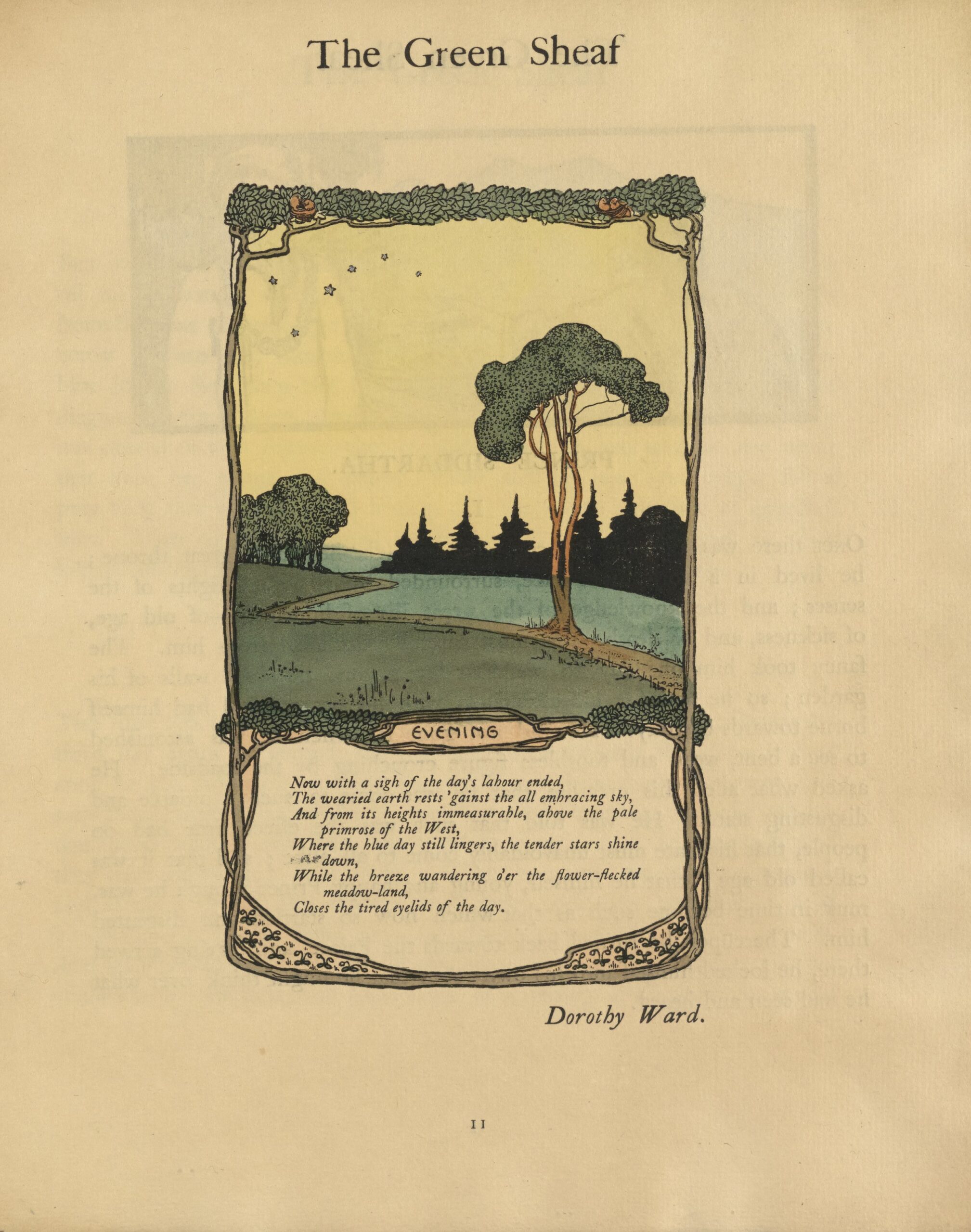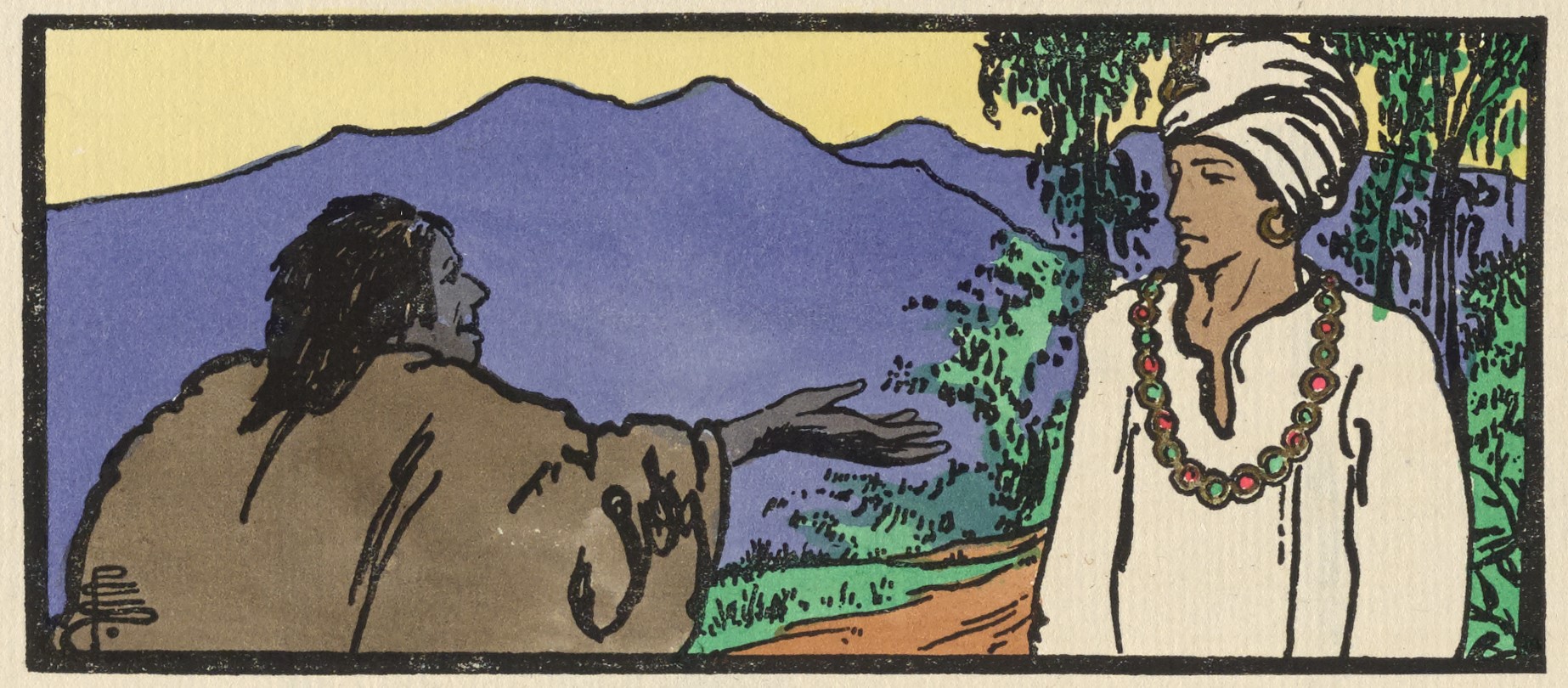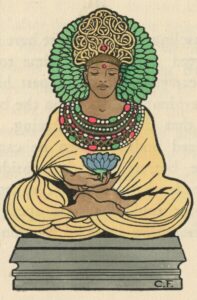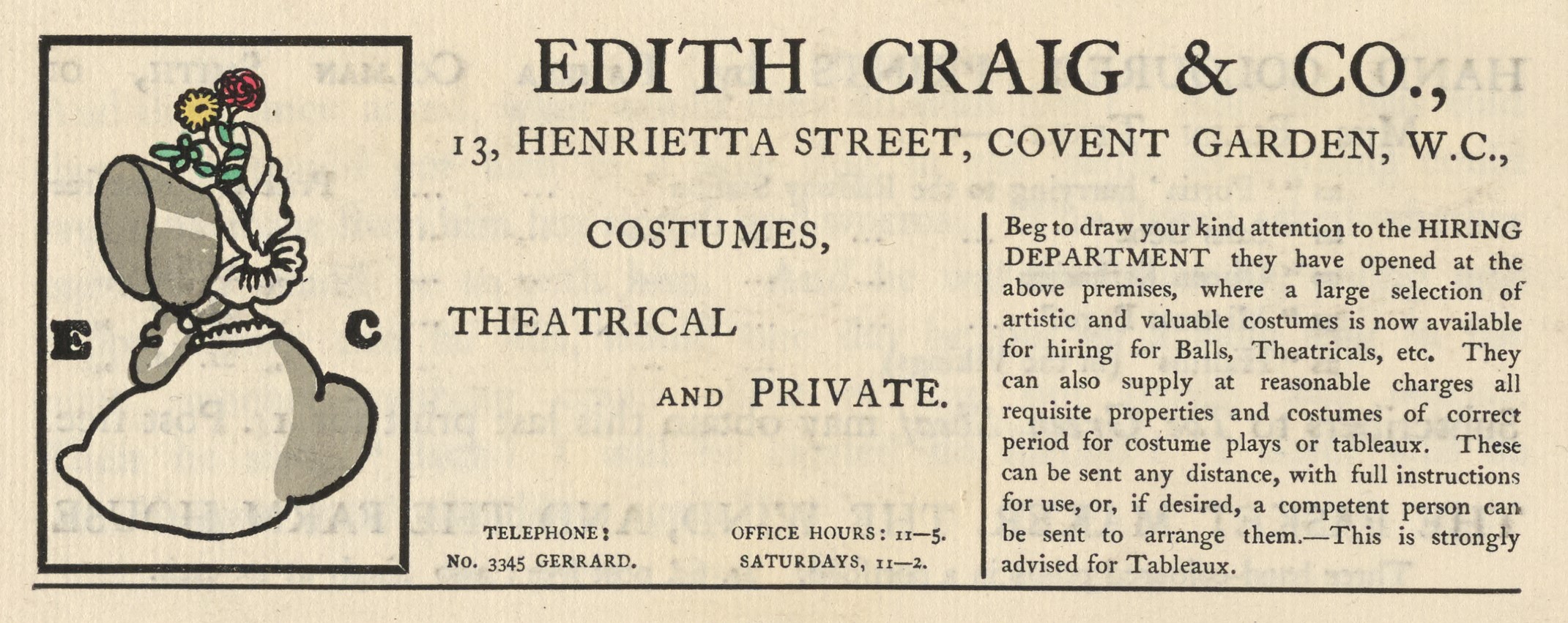TABLE OF CONTENTS
No. 4
Front Cover, by Pamela Colman Smith [i]
Untitled. [“Charles, do not you remember the caterpillar”], by Mrs. [Anna] Barbauld 2
Illustration by Pamela Colman Smith 2
The Water-Sprite, by Alix Egerton 3
Page decoration by Pamela Colman Smith 3
A Dream of Angus Oge, by A.E. 4-7
Pictorial initial by Pamela Colman Smith 4
Friends, by Cecil French 7
Illustration by Lewis Grant 7
A Sonnet, by Lucilla 8
Illustration by W.T. Horton 8
Alone, by Pamela Colman Smith 9
Illustration by Pamela Colman Smith 9
Song from Princesse Lointaine, translated by C.H. from Edmond Rotand 10
Illustrative Supplement. The Lake at Coole, by W.B. Yeats np
Evening, by Dorothy Ward 11
Prince Siddartha, by Laurence Irving 12-14
Illustration by Pamela Colman Smith 12
Illustration by Cecil French 14
Advertisements 15-16
Advertisement for Edith Craig & Co., by Pamela Colman Smith 16
Charles, do not you remember the caterpillar we put in a paper box, with
some mulberry leaves for it to eat ? It is gone—here is no caterpillar—
there is something in the box; what is it? I do not know. It is a
little ball of yellow stuff. Let us cut it open, perhaps we may find the
caterpillar. No, here is nothing but a strange little grub, and it is dead,
I believe, for it does not move. Pinch it gently by the tail.
Mrs. Barbauld.
THE WATER-SPRITE.
Nixie, Nixie, in the stream
Why do you hide your face by day?
Are you asleep? And do you dream?
Or do you hide your face in play?
Nixie, Nixie, you may hide
But I can see you over there,
Though into shadowy pools you glide
There floats behind your long green hair.
Nixie, Nixie, sweet and clear
You laugh beneath the water’s edge,
It ripples so, and I can hear
Your sighs among the river sedge.
Nixie, Nixie, if at night
I come when all the world’s asleep,
Oh, will you hold my hand quite tight
And let me in your palace peep.
Nixie, Nixie, turn your head,
I want to see your laughing eyes;
“There are no Water Sprites,” they said,
But I am a child and I am wise.
A DREAM OF ANGUS OGE.
BY A. E.
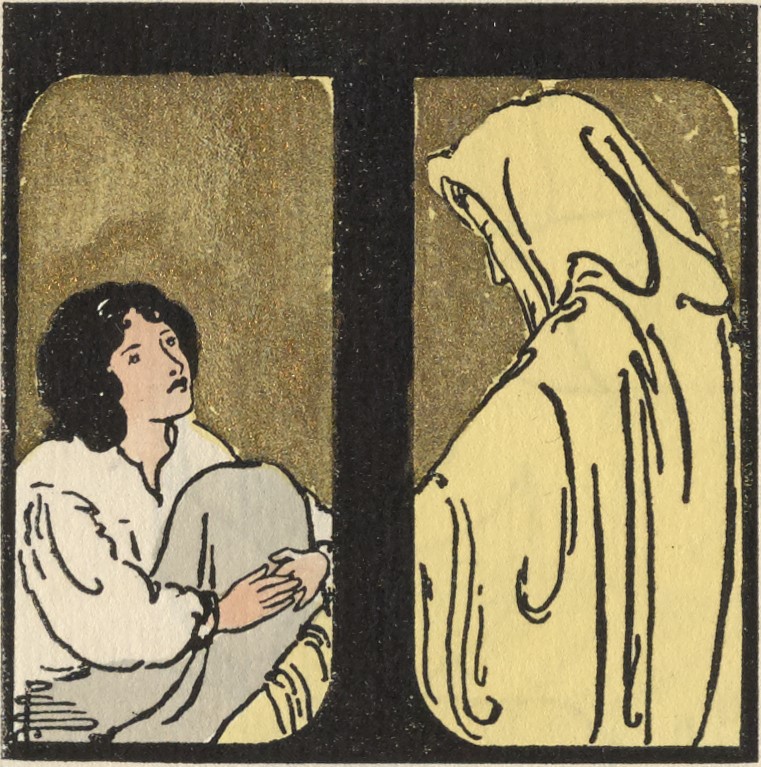
HE day had been wet and wild, and the woods
looked dim and drenched from the window where
Con sat. All the day long his ever-restless feet
were running to the door in a vain hope of sunshine.
His sister Norah to quiet him had told him over
and over again the tales which delighted him; the
delight of hearing which was second only to the
delight of living them over himself, when as
Cuculain
he kept the ford which led to Ulla,
his sole hero heart matching the hosts of Meave;
or as Fergus he wielded the sword of light
the Druids made and gave to the champion,
which in its sweep shore away the crests of the
mountain; or as Brian, the ill-fated child of
Turenn,he went with his brothers in
the ocean-sweeping boat further than ever Columbus
travelled, winning one by one
in dire conflict with kings and enchanters the treasures
which would appease the
implacable heart of Lu.
He had just died in a corner of the room from his many wounds when Norah
came in declaring that all these famous heroes must go to bed. He protested in vain,
but indeed he was sleepy, and before he had been carried half way to the room the
little soft face drooped with half-closed eyes, while he drowsily rubbed his nose
upon
her shoulder in an effort to keep awake. For a while she flitted about him, looking,
with her dark shadowy hair flickering in the dim, silver light, like one of the
beautiful heroines of Gaelic romance, or one of the twilight race of the Sidhe. Before
going she sat by his bed and sang to him some verses of a song, set to an old Celtic
air whose low intonations were full of a half-soundless mystery:—
“Over the hill-tops the gay lights are peeping:
Down in the vale where the dim fleeces stray Ceases the smoke jrom the hamlet upcreeping:
Come y thou, my shepherd, and lead me away.
“Who’s the shepherd?” said the boy, suddenly sitting up.
“Hush, alannah: I will tell you another time.” She continued still more softly:
“Lord of the Wand, draw forth from the darkness
Warp of the silver and woof of the gold:
Leave the poor shade there bereft in its starkness:
Wrapped in the fleece we will enter the Fold.
The Green Sheaf
“There from the many-orbed heart where the Mother
Breaths forth the love on her darlings who roam,
We will send dreams to their land of another
Land of the Shining, their birthplace and home.”
He would have asked a hundred questions, but she bent over him, enveloping
him with a sudden nightfall of hair to give him his good-night kiss, and departed.
Immediately the boy sat up again, all his sleepiness gone. The pure, gay, delicate
spirit of childhood was darting at ideas dimly perceived in the delicious moonlight
of
romance which silvered his brain, where many airy and beautiful figures were moving:
the Fianna with floating locks chasing the flying deer, and shapes more solemn, vast,
and misty, guarding the avenues to unspeakable secrets ; but he steadily pursued his
idea.
“I guess he’s one of the people who take you away to faeryland. Wonder if he’d
come to me ? Think it’s easy going away.” He had an intuitive perception of the
frailty of the link binding childhood to earth in its dreams. (As a man Con will strive
with what passionate intensity to regain that free gay motion in the upper airs.)
“Think I’ll try if he’ll come”; and he sang, with as near an approach as he could
make
to the glimmering cadences of his sister’s voice:
“Come, thou, my shepherd, and lead me away”
He then lay back quite still and waited. He could not say whether hours or
minutes had passed, or whether he had slept or not, until he was aware of a tall golden-
bearded man standing by his bed. Wonderfully light was this figure, as if the
sunlight ran through his limbs; a spiritual beauty was on the face, and those strange
eyes of bronze and gold with their subtle intense gaze made Con aware for the first
time
of the difference between inner and outer in himself.
“Come, Con, come away!” the child seemed to hear uttered silently.
“You’re the Shepherd,” said Con, “I’ll go.” Then suddenly: “I won’t come
back and be old when they’re all dead?” a vivid remembrance of Ossian’s fate flashing
upon him.
A most beautiful laughter, which again to Con seemed half soundless, came in
reply. His fears vanished: the golden-bearded man stretched a hand over him for a
moment and he found himself out in the night, now clear and starlit. Together they
moved on as if borne by the wind, past many woods and silver gleaming lakes, and
mountains which shone like a range of opals below the purple skies. The Shepherd
stood still for a moment by one of these hills, and there flew out riverlike a melody
mingled with a tinkling as of innumerable elfin hammers, and there was a sound of
many gay voices where an unseen people were holding festival, or enraptured hosts
who were let loose for the awakening, the new day which was to dawn, for the
delighted child felt that faeryland was come over again with its heroes and battles.
The Green Sheaf
“Our brothers rejoice,” said the Shepherd of Con.
“Who are they?” asked the boy.
“They are the thoughts of our Father.”
“May we go in?” Con asked, for he was fascinated by the melody, mystery and
flashing lights.
“Not now. We are going to my home where I lived in the days past when
there came to me many kings and queens of ancient Eire, many heroes and beautiful
women, who longed for the druid wisdom we taught.”
“And did you fight like Finn, and carry spears as tall as trees, and chase the deer
through the woods, and have feasting and singing?”
“No, we, the Danaans, did none of those things; but those who were weary of
battle, and to whom feast and song brought no pleasure, came to us and passed hence
to a more wonderful land, a more immortal land than this.”
As he spoke he paused before a great mound grown over with trees, and around it
silver clear in the moonlight were immense stones piled, the remains of an original
circle, and there was a dark, low, narrow entrance leading within. He took Con by
the hand, and in an instant they were standing in a lofty, cross-shaped cave built
roughly of huge stones.
“This was my palace. In days past many a one plucked here the purple flower
of magic and the fruit of the tree of life.”
“It is very dark,” said the child disconsolately. He had expected something
different.
“Nay, but look: you will see it is the palace of a god.” And even as he spoke a
light began to glow and to pervade the cave, and to obliterate the stone walls and
the
antique hieroglyphs engraven thereon, and to melt the earthen floor into itself like
a
fiery sun suddenly uprisen within the world, and there was everywhere a wandering
ecstasy of sound: light and sound were one; light had a voice, and the music hung
glittering in the air.
“Look, how the sun is dawning for us, ever dawning; in the earth, in our hearts,
with ever youthful and triumphant voices. Your sun is but a smoky shadow, ours the
ruddy and eternal glow; yours is far away, ours is heart and hearth and home; yours
is
a light without; ours a fire within in rock, in river, in plain, everywhere living,
every-
where dawning; whence also it cometh that the mountains emit their wondrous rays.”
As he spoke he seemed to breathe the brilliance of that mystical sunlight and to
dilate and tower, so that the child looked up to a giant pillar of light having in
his heart
a sun of ruddy gold which shed its blinding rays about him, and over his head there
was a waving of fiery plumage, and on his face an ecstasy of beauty and immortal
youth.
The Green Sheaf
“I am Angus,” Con heard; “men call me the Young. I am the sunlight in the
heart, the moonlight in the mind. I am the light at the end of every dream, the voice
for ever calling to come away. I am desire beyond joy or tears. Come with me; come
with me: I will make you immortal; for my palace opens into the Gardens of the Sun,
and there are the fire-fountains that quench the heart’s desire in rapture.” And
in the child’s dream he was in a palace high as the stars, with dazzling pillars jewelled
like the dawn and all fashioned out of living and trembling opal. And upon their
thrones sat the Danaan gods with their sceptres and diadems of rainbow light, and
upon their faces infinite wisdom and imperishing youth. In the turmoil and growing
chaos of his dream he heard a voice crying out, “You remember, Con, Con, Conaire
Mor, you remember!” and in an instant he was torn from himself and had grown
vaster and was with the Immortals, seated upon their thrones, they looking upon him
as a brother, and he was flying away with them into the heart of the gold when he
awoke, the spirit of childhood dazzled with the vision which is too lofty for princes.

FRIENDS.
Though many will rise up against us,
From the world that keeps lovers apart,
We shall yet have good friends, my beloved,
To urge the sweet will of the heart.
The sun and the moon will be with you,
Wheresoever your dwelling may be;
And the way of the winds ever blowing
In secret between you and me;
And the passionate moods that enfold me
In their life that can fail not nor tire,
Will flow through the hours of your exile,
Full of yearning and tender desire.
Though the world send its arrows against us,
We shall not be wholly apart,
For true lovers have friends, my beloved,
Who urge the sweet will of the heart.
Cecil French.
A SONNET.
They say when folks are by the faeries charmed,
No more with thought of love their bosom thrills,
No more by grief they may be hurt or harmed,
Their mortal blood runs cold as mountain rills;
For Nature round their willing spirits weaves
Such subtle influences of sky and earth,
That this close bond of kinship quite bereaves
Their souls of the old bonds of human birth:
And as they dance through moonlight’s floating floes,
Led by the faeries down some lonesome glen,
Oh! must they not with mere misgiving ache
To feel once more the friendliness of men,
And their hearts’ hungry solitude to slake
With home’s sweet cares, or sumptuous lovers’ woes.
Lucilla.
ALONE.
Alone and in the midst of men,
Alone ’mid hills and valleys fair;
Alone upon a ship at sea;
Alone—alone, and everywhere.
O many folk I see and know,
So kind they are I scarce can tell,
But now alone on land and sea,
In spite of all I’m left to dwell.
In cities large—in country lane,
Around the world—’tis all the same;
Across the sea from shore to shore,
Alone—alone, for evermore.
SONG FROM “PRINCESS LOINTAINE,"
By Edmond Rostand.
It is in truth a common part
On fair or dark to set your heart,
And sit and sigh your love throughout the day.
There is in love no strain or stress
With dark or fair at hand to bless,—
But I—I love the Princess Faraway.
To hold your love long staunch and true
Is no such wondrous deed for you
Whose lips may touch your loved one’s silken dress,
Whose hand perchance has sometimes known
Her fingers linger in your own,—
But I—I love the Faraway Princess.
But ’tis a thing apart to learn
To love without sweet love’s return,
To love for ever with no stint or stay,
To love in sorrow and in pain,
More purely, just because in vain,—
And so—I love the Princess Faraway.
And ’tis a thing apart, Supreme,
To love when one can hardly dream,
Invent, imagine all her loveliness,
Dreams are the glory of the earth—
Life without dreams, what is it worth?
And so—I love the Faraway Princess.
C.H.
PRINCE SIDDHARTHA.
I.
Once there was a young Prince in the East, the heir to a great throne;
he lived in a gorgeous Palace, surrounded by all the delights of the
senses; and the knowledge of the great ills of humanity—of old age,
of sickness, and of death—was most carefully excluded from him. The
fancy took him one day to see what lay beyond the high walls of his
garden; so he sent for his attendants with his bearers, and had himself
borne towards the city. He had not gone far, when he was astonished
to see a bent, weak and toothless figure crouching by the roadside. He
asked what ailed this creature, that he was come to such a pitiable and
disgusting state. He was told that such was the effect time had on
people, that his state must unavoidably come to all alike; and that it was
called old age: that he himself, young and happy Prince though he was,
must in time become such as that which now so startled and disgusted
him. Thereupon he turned back towards the Palace, and, having arrived
there, he locked himself into his own room that he might think over what
he had seen and heard.
The Green Sheaf
II.
But some consoling thought must have occurred to him, for he threw
off his depression, and again on the following day, gay and happy, had
himself borne towards the city. And as he travelled thither, he came
across a worn out, tottering man, who had dim eyes, and was quite
blue in the face, then the Prince asked the nature of this new form of
disgusting wretchedness; and they told him that the man he saw before him
was overtaken with disease, that it might come to any man at any time;
that even he, young and happy Prince tho’ he now was, might fall a
prey to it that very day, and become like the figure that then so appalled
him. Then again he turned back towards the Palace, and he shut
himself in his room and pondered over old age and over sickness.
III.
This time too, some consoling, thought must have come to him, for on the
third day again he started for the third time towards that city. And
anon he saw two men carrying something past him made of boards, and
something covered, but evidently heavy upon the boards. And the Prince
demanded what it was that they were carrying. And he was told that
they were carrying a dead body. Then he came out of his equipage,
and stepped up to the bearers and drew aside the covering. And
he asked what it was made that man look so horrible, and lie so still.
And he was told that never would that man speak or move again; that he
could not see nor hear, nor have sense of anything at all upon the earth.
The Green Sheaf
And the Prince asked, what would they do with him ? And he was told
that they would put him in a hole dug in the earth, as nothing could
ever now come from him but stench and worms. The Prince asked whether
one day it would be so with him. And he was told that he, young and
happy Prince tho’ he was, would one day be put in a hole dug in the
earth, whence nothing could come of him but stench and worms.
Then he said, “Back! I will be carried no further! I never will be
carried upon men’s shoulders again ! ”
IV.
And from that day this man set himself to destroy the foolish love and
desire for a thing so evidently vain and meaningless as appeared to him
the life of man upon the earth. He had his way fully; men accepted his
teachings and worshipped him under the name of Buddha.
Laurence Irving.
HAND COLOURED PRINTS by Pamela Colman Smith, of
Miss Ellen Terry:—
as “‘Portia’ hurrying to the Railway Station” ... ... Price Is. Post free.
as "Sans Gêne” ... ... ... ... ... ... ” Is. ”
as “Queen Katharine” ... ... ... ... ... ” 2s. 6d. ”
as “Mistress Page” ... ... ... ... ... ... ” 2s. 6d. ”
as “Hiördis” (in the Vikings) ... ... ... ... ” 2s. 6d. ”
Subscribers to The Green Sheaf may obtain this last print for Is. Post free.
THE BASKET MAKER, THE WIND, AND THE FARM HOUSE.
Three hand-coloured prints in a portfolio. 2s. 6d. post free; also singly at Is. each.
Any of the above may be had from the Editor of The Green Sheaf.
⎯
The Green Sheaf School of Hand Colouring, undertakes small Editions of
Books, Programmes, Cards, etc., for private Theatricals and Dances, also cards for
advertising
purposes. The School supplies the designs and executes the orders complete where desired.
For further particulars apply to The Editor, The Green Sheaf, 14 Milborne Grove, The
Boltons, S.W.
From ELKIN MATHEWS’ LIST.
THE GOLDEN VANITY AND THE GREEN BED: Words and
Music of Two Old English Ballads. With Pictures in Colour by Pamela Colman Smith.
4to, 7s. 6d. net.
“The illustrations are highly spirited in treatment. They exhibit a strong decorative
sense on the part of the
artist, the colour scheme being remarkably bold and well ‘harmonised.’”—Studio.
WIDDICOMBE FAIR: A series of 13 Coloured Drawings to this Old
West Country Ballad. By Pamela Colman Smith. 4to, in portofolio, 10s. 6d. net.
Published by ELKIN MATHEWS, Vigo Street,
Nigh the Albany, London.
The Green Sheaf
THE GALLERY, ONE PRINCE’S TERRACE,
HEREFORD ROAD, W.
JOHN BAILLIE requests the honour of a visit. Exhibitions every
three weeks.
A fine Collection of Modern Jewellery always on view.
Classes for Enamelling, Metal-work, Carving, Bookcasing, Water
Colours, Fan Painting, Wood Engraving, &c.
Gallery open 10.30 a.m. to 6 p.m.
⎯
The Supplement to this Number is a reproduction from a pastel
by W. B. Yeats, of The Lake at Coole.
The next number of The Green Sheaf will contain—
Poems and short stories by Lady Gregory, John Todhunter,
Alix Egerton, and L. C. Duncombe-Jewell.
Drawings by Cecil French, Pamela Colman Smith, Gordon Craig,
and W. T. Horton.
A few proof copies of the Rossetti drawing of Mrs. Stirling are
for sale at Eighteen pence each, post free.
There will be thirteen Numbers of The Green Sheaf in a year,
printed on antique paper and hand-coloured, and the Subscription is
Thirteen shillings annually, post free. Single Copies may be had at
Thirteen pence each.
Edited and Published by PAMELA COLMAN SMITH,
14, Milborne Grove, The Boltons, London, S.W.
ALL RIGHTS RESERVED.
MLA citation:
The Green Sheaf, No. 4, 1903. Green Sheaf Digital Edition, edited by Lorraine Janzen Kooistra. Yellow Nineties 2.0, Toronto Metropolitan University Centre for Digital Humanities, 2022. https://1890s.ca/gsv4_all/
